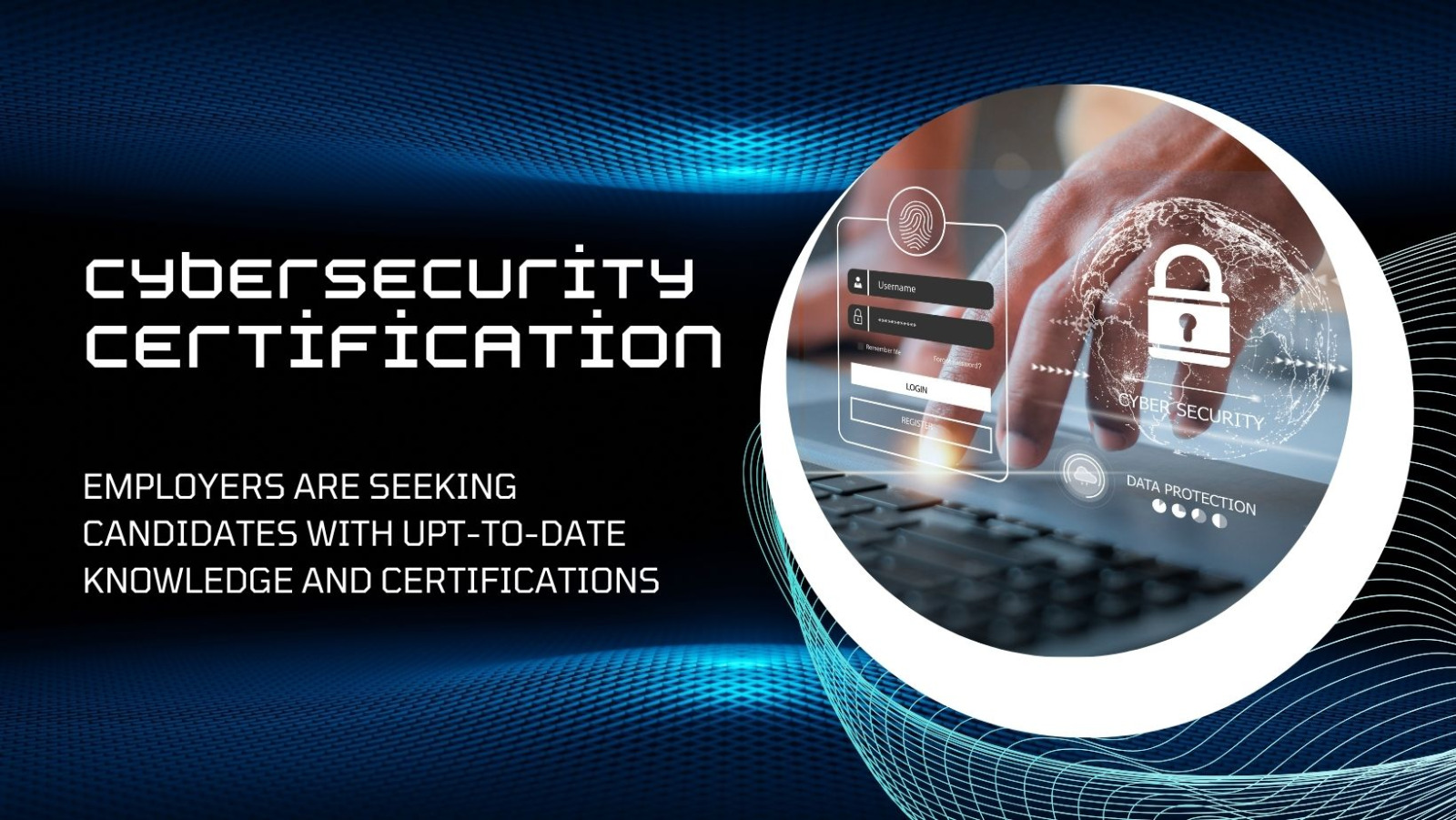7 Best Cybersecurity Certifications in 2024

As cyber threats continue to evolve, the demand for skilled cybersecurity professionals has never been higher. Whether you’re looking to break into the field or advance your existing career, obtaining the right cybersecurity certifications can give you a competitive edge.
In 2024, employers are seeking candidates with up-to-date knowledge and hands-on skills to protect their digital assets. This article will guide you through the seven most valuable cybersecurity certifications to pursue this year. From foundational credentials to advanced specializations, these certifications will validate your expertise and open doors to exciting opportunities in this rapidly growing industry. Read on to discover which certifications align with your career goals and how they can propel your cybersecurity journey forward.
Why Should You Get Certified in Cybersecurity?
In today’s digital landscape, cybersecurity certifications are invaluable assets. They demonstrate your expertise and commitment to protecting digital assets, making you stand out in a competitive job market. These credentials validate your skills, ensuring employers of your ability to handle complex security challenges. Moreover, certifications often lead to higher salaries and increased job opportunities.
By pursuing cybersecurity certifications, you’ll stay current with the latest threats and defense strategies. This continuous learning is crucial in an ever-evolving field. Additionally, many organizations require specific certifications for certain roles, making them essential for career advancement. Ultimately, becoming certified enhances your credibility and positions you as a trusted professional in the cybersecurity industry.
7 Best Cybersecurity Certifications
In today’s digital landscape, cybersecurity professionals are in high demand. As cyber threats evolve, organizations seek skilled experts to protect their digital assets. Cybersecurity certifications play a crucial role in validating your expertise and advancing your career in this dynamic field. These credentials demonstrate your proficiency in various aspects of information security, from network defense to ethical hacking.
The following seven certifications stand out as the best cybersecurity certifications in 2024, offering a blend of industry recognition, practical skills, and career advancement opportunities. Whether you’re a seasoned professional or just starting your cybersecurity journey, these certifications can help you stand out in a competitive job market and stay ahead of emerging threats.
AWS Certified Developer
AWS Certified Developers are IT professionals who specialize in developing and maintaining applications on the Amazon Web Services (AWS) platform. They design, build, and deploy cloud-based solutions using AWS services and best practices. Key responsibilities include writing code, implementing security measures, and optimizing application performance.
To become certified, candidates must have 1-2 years of hands-on experience with AWS and pass a rigorous exam. The job outlook for AWS Certified Developers is excellent, with high demand across industries. Salaries typically range from $90,000 to $150,000+, depending on experience and location.
Certified Information Security Manager (CISM)
A Certified Information Security Manager (CISM) is a highly sought-after cybersecurity professional responsible for developing and managing an organization’s information security program. CISMs oversee risk management, incident response, and compliance with security policies. They typically need 5+ years of experience in information security management.
The job outlook for CISMs is excellent, with a projected growth rate of 31% through 2029. This demand is driven by the increasing importance of cybersecurity in all industries. Salaries for CISMs are competitive, with the average annual pay ranging from $120,000 to $160,000, depending on experience and location.
AWS Certified Solutions Architect
As an AWS Certified Solutions Architect, you’ll design and implement scalable, highly available, and fault-tolerant systems on Amazon Web Services. Your responsibilities include analyzing business requirements, recommending optimal AWS services, and ensuring cost-effectiveness. You’ll need a strong understanding of AWS architecture best practices, security, and compliance.
Requirements typically include 1-2 years of hands-on AWS experience and proficiency in at least one high-level programming language. The job outlook is excellent, with a projected growth rate of 15% through 2029. Salaries for AWS Certified Solutions Architects range from $100,000 to $160,000 annually, depending on experience and location.
Certified in Risk and Information Systems Control (CRISC)
The Certified in Risk and Information Systems Control (CRISC) certification is highly valued in cybersecurity. As a CRISC professional, you’ll identify, assess, and manage IT risks within an organization. Your responsibilities include developing and implementing risk management strategies, ensuring compliance, and advising on risk-related decisions.
To qualify, you’ll need at least three years of relevant experience and pass a rigorous exam. The job outlook for CRISC professionals is excellent, with growing demand in various industries. Salaries are competitive, often ranging from $100,000 to $160,000 annually, depending on experience and location.
Certified Ethical Hacker (CEH)
As a Certified Ethical Hacker (CEH), you’ll be on the frontline of cybersecurity defense. Your primary role is to think like a malicious hacker, identifying vulnerabilities in systems and networks. You’ll conduct authorized penetration tests, analyze security policies, and recommend improvements to fortify digital infrastructures.
To become a CEH, you’ll need a strong foundation in IT and networking, plus specialized training. The certification requires passing a rigorous exam. With cyber threats escalating, the job outlook for CEHs is excellent. The U.S. Bureau of Labor Statistics projects a 35% growth in information security analyst jobs from 2024 to 2031.
CEHs command competitive salaries, with median annual wages around $102,600, according to the BLS. Top earners can make over $165,920 annually, depending on experience and location.
Certified Information Systems Auditor (CISA)
A Certified Information Systems Auditor (CISA) is a highly sought-after professional in the cybersecurity field. CISAs are responsible for auditing, controlling, and securing information systems within organizations. Their duties include assessing vulnerabilities, ensuring compliance with regulations, and implementing robust security measures.
To become a CISA, you’ll need a bachelor’s degree in a related field, at least five years of professional experience, and passing the CISA exam. The job outlook for CISAs is excellent, with a projected growth rate of 31% through 2029. Salaries for CISAs are competitive, with the median annual wage around $99,730, making it one of the best cybersecurity certifications for career advancement.
Certified Information Systems Security Professional (CISSP)
The Certified Information Systems Security Professional (CISSP) certification is a globally recognized credential for cybersecurity professionals. This prestigious certification validates your expertise in designing, implementing, and managing a best-in-class cybersecurity program.
As a CISSP, you’ll be responsible for developing security policies, managing risks, and overseeing the implementation of security controls. You’ll need at least five years of cumulative paid work experience in two or more of the eight domains covered by the CISSP Common Body of Knowledge.
The job outlook for CISSPs is excellent, with high demand across various industries. Salaries for CISSP-certified professionals are competitive, often ranging from $100,000 to $150,000 annually, depending on experience and location.
Choosing the Right Cybersecurity Certification for You
Selecting the ideal cybersecurity certification requires careful consideration of your career goals, current skill level, and industry demands. Begin by assessing your experience and identifying areas where you need to expand your expertise. Research the Best Cybersecurity Certifications available and their specific focus areas, such as network security, ethical hacking, or cloud security.
Consider the certification’s recognition within the industry and its potential impact on your career advancement. Evaluate the time commitment and financial investment required for each certification. Additionally, review the prerequisites and exam format to ensure you’re adequately prepared.
Remember, the right certification should align with your long-term career objectives and the evolving landscape of cybersecurity threats.
Frequently Asked Questions
These are some frequently asked questions and answers about the best cybersecurity certifications.
What cybersecurity certification should I get first?
It depends on your experience level and career goals. For beginners, CompTIA Security+ is a good place to start as it covers the fundamentals of cybersecurity. CISSP is best for mid-level to senior security professionals.
How long does it take to study for a cybersecurity certification?
The amount of study time required varies by certification. As a general guideline, plan to spend:
- 100-200 hours for CompTIA Security+
- 250-350 hours for CISSP
- 300-500 hours for GIAC certifications
However, study time depends heavily on your current skill level and experience. Some people need less time while others require more.
What skills do cybersecurity certifications test?
Common skills tested include:
- Risk management
- Security controls and countermeasures
- Security policies and procedures
- Threat and vulnerability management
- Incident response and business continuity planning
- Security architectures and design principles
- Cryptography and access control mechanisms
The specific skills tested depend on the focus of the particular certification.
How much does a cybersecurity certification cost?
Exam fees typically range from $300 to $800 or more, depending on the certification. You may also need to pay for study materials, courses, and practice tests.
Conclusion
As you consider advancing your cybersecurity career in 2024, these seven cybersecurity certifications stand out as the most valuable and in-demand credentials. By pursuing one or more of these certifications, you’ll demonstrate your expertise, expand your skill set, and position yourself for exciting opportunities in this rapidly evolving field. Remember to carefully evaluate each option based on your career goals, experience level, and areas of interest.
Whichever path you choose, investing in your professional development through these industry-recognized certifications will undoubtedly enhance your marketability and effectiveness as a cybersecurity professional. Stay committed to continuous learning, and you’ll be well-equipped to tackle the complex security challenges of tomorrow.
Other areas such as cryptocurrency expertise can be considered.



